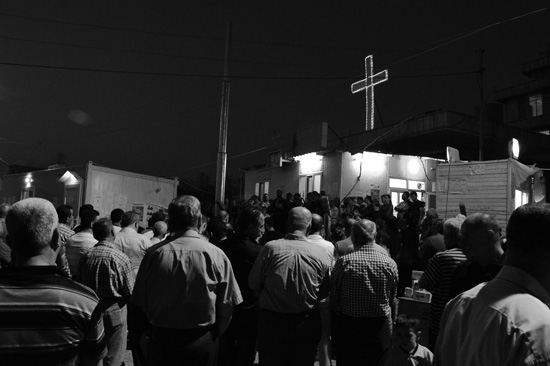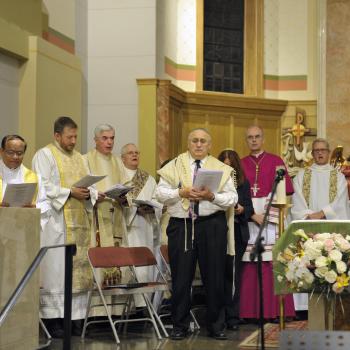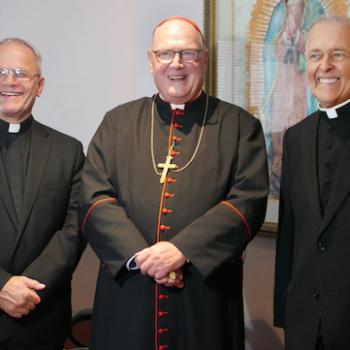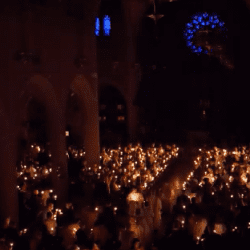The Autumn edition of ONE, the magazine of CNEWA, is now online, and the centerpiece is an astonishing and moving glimpse at life for Iraqi Christian refugees in Erbil.
Journalist Don Duncan captures it in all its harrowing detail:
On talking to many Christian families and individuals who have taken refuge in cities across Iraqi Kurdistan, the master narrative is the same: ISIS, the jihadist Islamic terrorist movement seeking to create a caliphate in Iraq and Syria, had made rapid advances across large swaths of Iraq, and by early August, seized the Nineveh Plain in northern Iraq — a historic Christian stronghold.
The sixth day of August promises to be a date that will be seared into the Iraqi Christian psyche for quite some time: That is the day Iraqi Christendom finally — and maybe definitively — succumbed to extremists and much of the population was sent fleeing.
The exodus was rapid and frantic, beginning in the evening of 6 August. Families recount how they had 15 minutes to half an hour to grab what they could and leave, ahead of the rapid arrival of ISIS. The roads were choked with families in cars and on foot — Chaldean and Syriac Catholics, Copts and Armenians, but also Yazidis and Shiite Muslims from all over Nineveh — all fleeing the particular brand of ISIS fundamentalism. They headed east, to Iraqi Kurdistan and the protection of the Kurdish Peshmerga forces there. By the next morning, the heartland of Christian Iraq was firmly in the hands of ISIS.
“My father sold his own mother’s gold and took a loan from the government so he could build our house, and then everything was gone in 15 minutes,” says Wissam Abdul Hadi. “He worked for years and lost everything in a few minutes.”
The sense of loss and the incomprehension of the sudden, new reality are common to many of the displaced families. Beyond the shared narrative of expulsion, the personal stories issuing from the camps, church grounds and repurposed schools and social centers housing displaced Christians are varied and many.
Take Sister Maria Hanna, mother superior of the Dominican Sisters of St. Catherine of Siena, who said a final prayer in tears in the Qaraqosh convent’s chapel before fleeing it with 40 of her sisters.
Then there is Basmina Rahimo, who fled Mosul for Qaraqosh in July and then had to flee Qaraqosh for Erbil. Her son remained in Qaraqosh as it was seized by ISIS. She has heard no word from him since.
“I cry every day,” she says. “I pray and I am fasting, but still there is no sign of him so I am simply hoping.”
Tissa Raffo, 34, who was paralyzed in 2006 when she was caught in the crossfire between U.S. forces and insurgents, suffered disturbing flashbacks as she and her family fled in the dark of night, surrounded by artillery fire.
Ibtihaj Rifo, a mother of three from the Christian town of Bartella, remembers having to climb out of the car and crawl beneath it at one point of their exodus to avoid the gunfire exchanged between ISIS and the Peshmerga.
Christians from the major towns of Qaraqosh, Bartella and Tel Afar, as well as from villages all across the Christian plain of Nineveh, are now scattered across cities in Iraqi Kurdistan, such as Erbil, Dohuk, Kirkuk and Sulimaniyeh.
At a distance of 46 miles, Erbil is the nearest Kurdish city to Qaraqosh and, therefore, received the largest number of displaced people, currently estimated at more than 60,000. Most of them descended on the Christian neighborhood of Ain Kawa over the span of just a couple of days. Because of the overpopulation, living conditions for displaced Christians are the worst in Erbil.
Any and all resources were tapped so as to offer the displaced shelter and food. The Dominican Sisters of St. Catherine of Siena, the Ephremite and Franciscan sisters, the Little Sisters of Jesus as well as Chaldean and Syriac priests and bishops were all mobilized. For the first week, many people were sleeping in churchyards without shelter, using each other’s stomachs as pillows. They complained of the scourge of ants at night and of the strong, beating sun during the day.
Check out the rest of the magazine. And visit CNEWA’s blog One-to-One and read the full story here.
And please: keep the people of Iraq in your prayers. Winter is coming.












